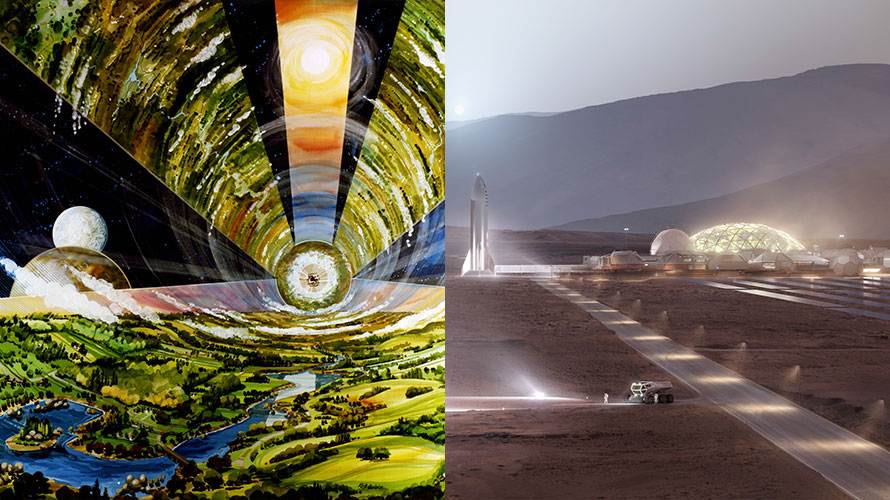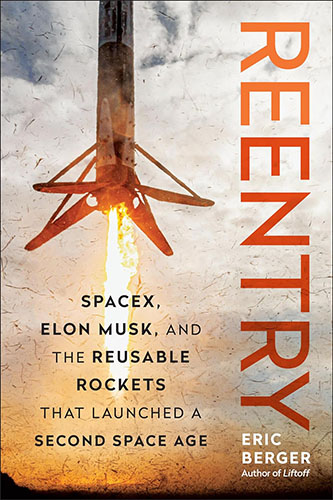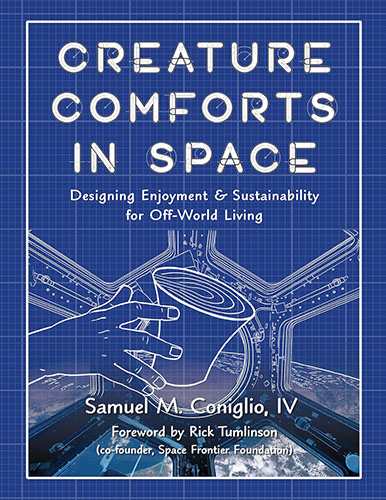By Dale L. Skran
Copyright 2019
The deceptively simple term “space settlement” can become controversial among space advocates. The purpose of this essay is to systematically lay out what “space settlement” means to me, and also what it is not.
Before we get too far into this, it is important to clearly differentiate between “space settlement” and “a space settlement.” Space settlement is the general process of developing and settling space. A space settlement is a specific place in space where people live, work, and raise families.
Let’s start with a relevant dictionary definition of settlement—“the settling of persons in a new place.” This definition is almost immediately self-referential, as it refers to “settling of persons.” When we look at “settle” the verb, we see definitions that include “to migrate to and organize (an area, territory, etc); colonize,” “to cause to take up residence,” and “to furnish (a place) with inhabitants or settlers.”
All these definitions revolve around people living in a new place—“colonizing,” “taking up residence,” etc. This is very important—“taking up residence” implies permanence, family life, a job, and so on. A soldier being assigned to a base for a year is not “colonizing” or “taking up residence”—instead they are “being deployed.” A scientist might be “assigned” to work at a base in Antarctica for a period of time, but they are not “colonizing” Antarctica.
Thus, I propose that a “space settlement” is a group of people (men, women, children) who move to some specific location in space (Moon, Mars, an asteroid, orbital free space, etc.) to take up permanent residence there. This implies that they will raise their children in this “space settlement,” work in or near the “space settlement,” and in all probability die and have their remains disposed of there as well.
Just as towns are started, grow, and then sometimes decline on the Earth, not all space settlements will necessarily last a very long period of time. The requirement is that they are intended to be permanent, not that they actually will be. The ancient town of Petra in Jordan was a settlement that declined over a long period of time and finally became empty as it lost out economically due to changing trading routes.
It is immediately clear that an oil drilling platform, an army base, or an Antarctic science station, although they may function for many years or even decades, are not settlements. Families don’t live there, children are not born there, and no one is buried there. It follows that similar facilities in space are also not settlements. Thus, even if we maintain the ISS forever, it is not a settlement—it is a scientific outpost or base. ISS-like bases on the Moon or Mars are equally not settlements, even if they are more self-sustaining than the ISS. In fact, to be at all affordable, a scientific base on the Moon or Mars would need to be much more independent of Earth than the ISS.
The question arises—suppose there is a long established base, and people start raising their families there. Is this then a settlement? As it turns out, there is an Argentine base in Antarctica where families live year around, Esperanza, mainly supporting what amounts to the tourist trade. Since it has been in operation for some time, it could be argued that Esperanza Base is economically self-sustaining. Could a similar base on the Moon, permanently occupied by families that support both scientific and adventure tourists be considered a settlement? Perhaps it could, but is this the sort of “settlement” that space advocates have in mind establishing?
I suggest that Esperanza Base, although arguably a settlement, is not what most space advocates have in mind when they argue for “space settlement.” I believe that they implicitly have some additional characteristics that they want to see in “space settlements”: The settlements should be part of an economic web that is, at least theoretically, on a path toward being independent of the Earth. In practice, this suggests that the settlements should be economically robust enough that in the event that as the result of some natural catastrophe, war, or other upheaval, Earth lost all interest in space settlements, those settlements could continue on after a period of adjustment, and would grow in space in a sustainable fashion.
Esperanza Base in Antarctica does not come close to meeting this requirement. If the base was not supported by large imports of supplies and a steady supply of tourists, it could not survive.
In order to meet the above requirement, a space settlement would need to:
- Be part of a web of space settlements with sufficient redundancy to survive the failure of any single space settlement.
- Be part of a web of space settlements with sufficient economic specialization to maintain a functional, self-sustaining civilization. This implies schools, universities, hospitals, factories, etc.
Sometime people suggest that there is a magic number that makes a base a settlement. This is clearly not the case. Once can imagine a very large base—with thousands of soldiers for example—that is far from being a settlement. It is also important to keep in mind that with 3D-printing, robotics, and artificial intelligence, the number of people needed for a settlement to be economically self-sustaining may be much lower than would be the case on Earth with current technology.
For long term expansion, genetic variety is required, which it is often suggested requires something like 600 people at a minimum, with several thousand being much more robust. However, with the kind of genetic technology likely to available 50 years from now, this number might be much reduced.
Returning from the more distant future to the present day, perhaps the most critical issue is why anyone would bother to create a space settlement. This is the vital issue. Some envision a Star-Trek like future where a large fraction of the Earth’s wealth goes toward maintaining a network of off-world settlements, all government funded. Although theoretically possible, it is virtually impossible to imagine what would motivate this scenario.
A more plausible road to space settlement is via the growth of private, commercial activity in space. In this view, for any space settlements to exist there needs to be sufficient economic activity in space to do one of the following:
- Employ the inhabitants of the space settlements, or
- Create sufficient wealth to sustain the space settlements as a by-product of economic activity.
Classically, O’Neill envisioned thousands of space-suited settlers building Solar Power Satellites. This would be an example of the first case. It is perhaps more likely that the settlements will be maintained as a spin-off of wealth generating activities in space that are mainly robotic in operation. However, there must be some kind of large economic activity in space for space settlements to exist.
This is not to suggest that space settlements will be commercially owned “company towns.” Our experience with such things on Earth suggests that they are not pleasant to live in or capable of long-term growth.
A brief perusal of the NSS, Space Studies Institute, and Space Frontier foundation websites does not reveal a short definition of “space settlements” along the lines I have been discussing. A recent letter to Space News by Al Globus avers that “By settlement we mean places for people to live out their lives and raise children.” This is consistent with the discussion above, but certainly not complete. The Globus letter exists in the context of explaining the Alliance for Space Development focus on “development and settlement of space,” and further states that “By development we mean commercial, private, eventually self-sustaining industrialization of space.” Later Globus states that space settlement “… requires a strong, self-sustaining industrial infrastructure that is not dependent on the political winds of the moment….”
There are a number of key ideas here:
- Space settlement is not just about numbers or material self-sufficiency. It is possible to imagine scientific bases on the Moon or Mars that have large populations and are, thanks to robots and 3D printing, virtually or entirely self-sufficient, but that are staffed via rotation, don’t include families, and are completely dependent on government funds. The disaster on Earth that most threatens such space projects is a governmental budget cut, and space settlements need to be free of such pressures.
- There is a relationship between development and settlement in space. To support settlement in a permanent self-sustaining fashion, private industry on a large scale is required, either to produce jobs for the settlers or wealth to sustain them.
- Settlements involve raising families and living permanently, not periodic rotations of professional staff.
The Globus letter refers to “private” commercial activity, which might exclude kibbutz-style settlements where property is owned and operated in common. Although there is good reason based on long experience on Earth to think that such settlements will not be the dominant organizational form of a large-scale space-based civilization, there is no reason to exclude such forms. It is also possible that the kibbutz may prove better adapted to space conditions than Earth conditions.
To summarize, the space settlements we are working to establish have the following characteristics:
- Families live in them on a permanent basis
- The settlements engage in commercial activity that generates the wealth needed to sustain them, and are not dependant on infusions of government funds.
- They are large enough and diverse enough to be, at least potentially, both economically and biologically self-sustaining.
- They may have a variety of organizational forms, including kibbutz style common ownership of the settlement, systems based on private property, company towns, or religious communities.
None of the above is intended to exclude any government role or activity. In a robust network of space settlements one would expect to find local space settlement governments, associations or unions of space settlement local governments, and outposts supported by governments on Earth. There might also be commonly used communications or navigation infrastructure that is largely or wholly government supported.
In conclusion, here is a short definition of space settlement using these ideas:
“A space settlement” refers to a habitation in space or on a celestial body where families live on a permanent basis, and that engages in commercial activity which enables the settlement to grow over time, with the goal of becoming economically and biologically self-sustaining as a part of a larger network of space settlements. “Space settlement” refers to the creation of that larger network of space settlements.





















4 thoughts on “SPACE BASICS: What is Space Settlement?”
There is an opportunity facing us for establishing a meaningful space settlement, the result of which would benefit all of civilization. The scientific community is in near unanimous agreement that to limit climate collapse, civilization must wean itself from fossil fuels. This means an alternative energy source must be tapped, one that is consistent, reliable and abundant in the quantity of energy required at a global scale. The sun is the logical choice, but trying to capture the quantity of solar energy needed from here on the ground is problematic. A better option is to capture it in space and beam it down to Earth, an idea that has been around for a half century or more. The National Space Society has recently issued a position paper advocating a serious re-look at that possibility. But attempting to place sufficient solar power plants in GEO from the Earth’s surface is also problematic: the gravity well is too deep. A better choice is to use the Moon as a base of operations: it has much of the materiel needed, and as far as the gravity well is concerned, offers a much easier trip. A reason, then, to return to the Moon, is to establish a foundation for the production of materials, and perhaps components, for transport to GEO of the power plants that can help preserve the viability of civilization – a benefit to us all. Rather than the somewhat fuzzy rationales put forth for returning to the Moon, this should be THE reason. The logic is simple: this planet needs energy; the best source of that energy is the sun; the best place to capture that energy is in orbit around this planet; the best source for providing the materials and components for that global power system is the Moon. The scale of activity involved to accomplish this would by necessity entail a sizable settlement on the Moon.
And the time available may be limited: going back to the Moon requires considerable resources. As climatic catastrophes (storms, droughts, floods, heat) continue to grow in number and severity, civilization’s resources will increasingly be diverted to attempt to recover, and this may well reach the point where little energy is left to support space operations of any sort. If this occurs, all the hopes and dreams of becoming a space-faring civilization will vanish.
Dale Skran, your analytical skills and comprehension of human characteristics as presented in the National Space Society article regarding Space Settlement are amazing!
Now if Al Globus could give you a background utilizing his skills with a guitar it would bring a depth and we can recirculate here, there and everywhere.
I want to be an astronaut, and from my school I was selected and our team was going to USA but for this corona.
Are the Sun Cities by Del Webb communities? Well, they are large, have community activities, and grow.
But they don’t biologically reproduce or sustain themselves via commercial activities. Are we then to declare that they don’t fit our definition of communities and therefore are not communities?
The analogy isn’t irrelevant to the discussion of space settlements because, as private space settlement first starts, the people who go will dominantly be the people who can afford to go. Those will tend to be older because it takes many years to save up that amount of money. But older people tend to be beyond their reproductive years. Are we to say that, because they use their savings and not ongoing commercial activity and because they are beyond their reproductive years that they don’t qualify as settlers even though they have sold their Earth home and have literally settled down off Earth?
What if, like the Sun Cities, they are a large community with the fullness that we would expect in a space settlement including: diversity of residents, community activities, history, identity (e.g. libertarian colony), governance, rules / laws, elections, and external political relationships. What if they have voted to become politically independent, written their own constitution, voted their official languages, and stated their borders?
Would we still say that they are not a settlement because they are mostly an active retirement community, have been growing via immigration rather than naturally, and because they are successfully financed by their own savings / pensions just as residents of the Sun Cities do?
This isn’t just a hypothetical question. O’Neillians specifically require that settlements must be biologically reproductive because free space can offer a full gee whereas it is currently unknown for the Moon and Mars. It is also relevant because near-term settlements deserve near-term advocacy. Most all agree that lunar and Martian communities can be established before those in free space due to the lack of immediate material resources of the latter.
Communities that look like settlements will be considered to be settlements by everyone even if they don’t technically live up to the extended definitions that some have for space settlements